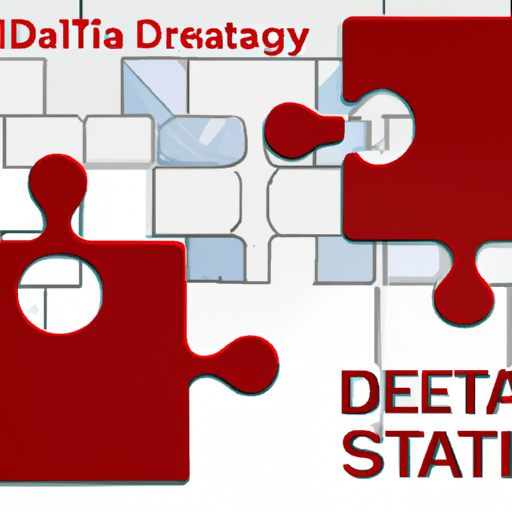In today’s data-driven world, businesses rely heavily on the collection, analysis, and interpretation of data to make informed decisions. However, not all data is created equal, and without a robust data collection strategy, companies risk obtaining unreliable and incomplete information. A well-designed data collection strategy is crucial for businesses to gather accurate and relevant data, ensuring they have a solid foundation for making sound business decisions. In this article, we will explore the importance of a data collection strategy and provide practical tips for implementing one effectively. Whether you are a seasoned business owner or a manager seeking to enhance your company’s data collection practices, this article aims to equip you with the knowledge and tools necessary to optimize your data collection efforts.

Data Collection Strategy
In today’s data-driven business environment, organizations rely on data collection strategies to gain valuable insights and make informed decisions. A well-planned and executed data collection strategy helps businesses understand their needs, set clear objectives, identify relevant data, choose the right methods, plan the data collection process, ensure data quality, manage data storage, and analyze and interpret data. Evaluating and improving the strategy is also critical to ensure its efficacy. Let’s delve deeper into each aspect of a comprehensive data collection strategy.
Importance of Data Collection
Data collection is of paramount importance for businesses in various ways. Firstly, it helps in understanding the business itself, including its operations, customers, and market dynamics. By collecting relevant data, organizations can gain insights into their customers’ preferences, behaviors, and needs. This understanding enables businesses to tailor their products and services to meet customer demand effectively.
Additionally, data collection allows businesses to identify key metrics or key performance indicators (KPIs) that are crucial for measuring success and tracking progress. These KPIs help in evaluating the performance of various business processes and strategies, enabling organizations to make data-driven decisions.
Moreover, data collection plays a vital role in improving efficiency and effectiveness. By analyzing data, businesses can identify areas of improvement, eliminate inefficiencies, and optimize their operations. This leads to cost reductions, enhanced productivity, and improved overall performance.
Understanding the Needs
To develop an effective data collection strategy, it is crucial to understand the needs of the business. This involves identifying the specific data requirements that are necessary to address the organization’s challenges and goals. It is important to define the scope of data collection, determining the extent to which data collection should cover various aspects of the business.
Considering stakeholder perspectives is also essential when understanding the needs. Stakeholders may include customers, employees, partners, and regulatory agencies. Their perspectives and requirements should be taken into account to ensure that the data collection strategy is well-rounded and comprehensive.
Setting Clear Objectives
Setting clear objectives is a vital step in developing a data collection strategy. The purpose of data collection must be determined, whether it is to gain insights into customer behavior, evaluate the effectiveness of marketing campaigns, or measure employee performance. Specific goals should be established to achieve these objectives.
Aligning the objectives of data collection with the overall goals of the business is crucial. By ensuring alignment, the data collected will be directly relevant and actionable, leading to meaningful insights and informed decision-making.
Identifying Relevant Data
Identifying the relevant data is essential for a successful data collection strategy. It involves defining the types of data to be collected, such as customer demographics, transactional data, or market trends. The sources of data must also be determined, whether it is through customer surveys, social media platforms, operational databases, or third-party data providers.
A distinction must be made between qualitative and quantitative data. Qualitative data provides insights into the motivations, preferences, and opinions of individuals. Quantitative data, on the other hand, focuses on measurable metrics and numerical data. Both types of data have their own advantages and can provide valuable insights when collected and analyzed effectively.
Choosing the Right Methods
To collect data effectively, businesses need to choose the appropriate methods. Several methods can be utilized, depending on the objectives and the types of data to be collected.
Surveys and questionnaires are commonly used methods to gather opinions and feedback from customers or employees. Interviews and focus groups allow for in-depth discussions and insights. Observational studies involve observing and recording behaviors and interactions. Experimentation involves manipulating variables to test hypotheses. Existing data analysis utilizes already available data sources, such as sales records or customer databases.
The choice of method will depend on factors such as the target audience, research goals, available resources, and desired level of detail.
Planning the Data Collection Process
Developing a comprehensive data collection plan is crucial to ensure the smooth execution of the strategy. This involves creating a detailed plan outlining the specific data collection methods, timelines, and milestones. Responsibilities should be assigned to ensure that the necessary tasks are completed within the defined timelines.
Ethical considerations should be taken into account throughout the data collection process. This includes obtaining informed consent from participants, ensuring privacy and data protection, and adhering to relevant regulations and guidelines. Budgeting and resource allocation should also be considered to ensure that the strategy can be implemented effectively.
Ensuring Data Quality
Data quality is essential for accurate and reliable analysis. Validation and verification processes should be in place to ensure the accuracy and completeness of data. This involves checking for errors, inconsistencies, and missing data. Minimizing errors and biases is crucial to maintain data integrity.
To ensure data quality, organizations can implement quality control measures such as data cleaning, outlier detection, and data validation techniques. Data privacy and security should also be prioritized to protect sensitive information from unauthorized access and breaches.
Data Storage and Management
Selecting the appropriate tools and technologies for data storage and management is crucial for an effective data collection strategy. There are various options available, including cloud-based solutions, databases, and data management systems. The chosen system should align with the organization’s data requirements, scalability, security, and accessibility needs.
Organizing and storing data in a structured manner makes it easier to retrieve and analyze the information when needed. Data backup and recovery processes should be established to prevent the loss of valuable data. Data retention and archiving policies should also be defined to ensure compliance with data regulations and legal requirements.
Data Analysis and Interpretation
After collecting the data, the next step is to analyze and interpret it. Data analysis techniques vary depending on the nature of the data and the research objectives. This may involve statistical analysis, data visualization, or qualitative analysis methods.
Data analysis plays a crucial role in driving business growth and decision-making. By effectively analyzing and interpreting the collected data, businesses can gain valuable insights, identify patterns, and make data-driven decisions. This leads to improved performance, increased efficiency, and a competitive edge in the market.
Evaluating and Improving the Strategy
Evaluating the effectiveness of the data collection strategy is essential to identify any gaps or areas for improvement. Regular assessment of the strategy’s outcomes and the data collected allows organizations to make necessary adjustments and refinements.
The feedback received from stakeholders, including customers and employees, can also provide valuable insights for enhancing the data collection strategy. Continuous improvement is crucial to ensure that the strategy remains relevant, aligned with business goals, and capable of addressing evolving needs.
Frequently Asked Questions
What are the common challenges in data collection?
Data collection can present various challenges, such as obtaining representative samples, ensuring data accuracy and validity, protecting data privacy, managing time and resources effectively, and minimizing biases and errors in data collection.
How can I ensure data integrity and reliability?
Data integrity and reliability can be ensured through validation and verification processes, implementing quality control measures, minimizing errors and biases, and adhering to data privacy and security standards. Regular checks and audits can also be conducted to maintain data integrity.
What are the best practices for data storage and management?
Best practices for data storage and management include selecting appropriate tools and technologies, organizing and storing data in a structured manner, implementing data backup and recovery processes, defining data retention and archiving policies, and complying with data regulations and legal requirements.
Which factors should be considered when choosing data collection methods?
When choosing data collection methods, factors such as research objectives, target audience, available resources, desired level of detail, ethical considerations, and the nature of the data to be collected should be taken into account.
How can data analysis drive business growth and decision-making?
Data analysis provides businesses with valuable insights, enabling them to identify patterns, trends, and correlations. By making informed decisions based on the analysis, organizations can drive business growth, improve performance, enhance efficiency, and gain a competitive advantage in the market.
